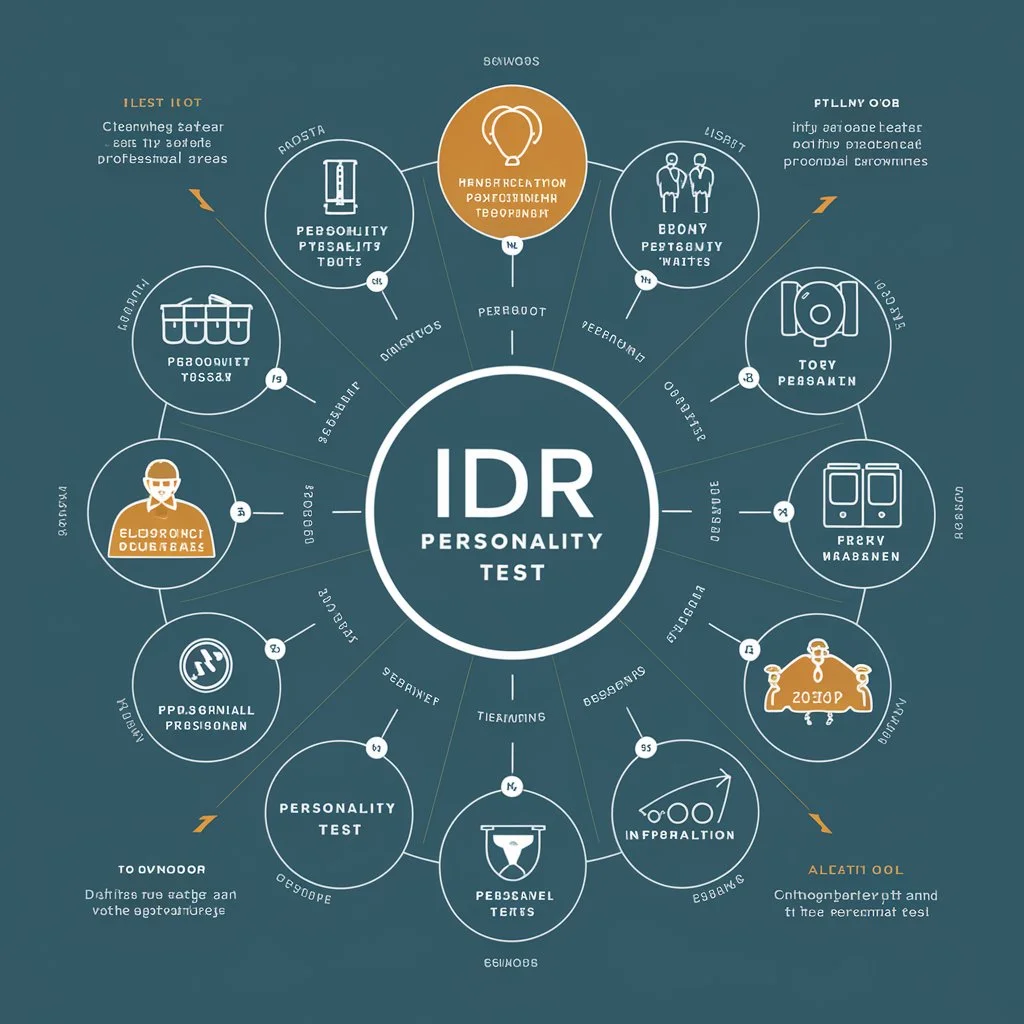The IDR personality test is a powerful tool designed to help you achieve greater self-awareness and personal development.Understanding your personality can unlock new insights into your strengths, weaknesses, and potential growth areas.
- Discover the history and development of the IDR personality test.
- Learn about the benefits of taking the IDR personality test for personal and professional growth.
- Find out how the IDR personality test compares to other popular personality assessments.
In this blog post, we will explore the IDR personality test in detail, covering its history, benefits, and practical applications.
What is the IDR Personality Test?
History and Development
The IDR personality test has a rich history rooted in psychological research and development. Created by leading psychologists, the test aims to provide a comprehensive understanding of individual personalities. The IDR test incorporates various psychological theories and methodologies to ensure accuracy and reliability.
Purpose and Goals
The primary goal of the IDR personality test is to enhance self-awareness and personal development. By taking the test, individuals can gain insights into their personality traits, strengths, and areas for improvement. The test also aims to help individuals understand how their personality affects their relationships, career, and overall well-being.
How it Differs from Other Personality Tests ?
The IDR personality test stands out due to its unique combination of psychological theories and its focus on practical applications. Unlike other personality tests that may only provide surface-level insights, the IDR test offers a deeper understanding of one’s personality. It also provides actionable recommendations for personal and professional growth, making it a valuable tool for individuals seeking self-improvement.
How the IDR Personality Test Works?
Structure of the Test

The IDR personality test is structured to assess various aspects of an individual’s personality. It typically consists of multiple sections, each focusing on different personality traits and behaviors. The test is designed to be user-friendly, with clear instructions and easy-to-understand questions.
Types of Questions Asked
The questions in the IDR personality test are carefully crafted to elicit honest and accurate responses. They range from multiple-choice questions to situational scenarios, ensuring a comprehensive evaluation of one’s personality. The questions are designed to be thought-provoking and reflective, encouraging individuals to consider their true feelings and behaviors.
Scoring System and Interpretation
The IDR personality test uses a sophisticated scoring system to analyze responses and generate a detailed personality profile. The results are presented in an easy-to-read format, highlighting key personality traits and providing explanations for each. Individuals can use these insights to better understand themselves and make informed decisions about their personal and professional lives.
The Science Behind the IDR Personality Test
Psychological Theories Involved
The IDR personality test is based on several well-established psychological theories. These include theories of personality development, cognitive-behavioral approaches, and emotional intelligence frameworks. By integrating these theories, the test provides a holistic view of an individual’s personality.
Validity and Reliability of the Test

Extensive research and testing have been conducted to ensure the validity and reliability of the IDR personality test. Studies have shown that the test accurately measures personality traits and provides consistent results over time. This makes it a trusted tool for individuals seeking to understand themselves better.
Research and Studies Supporting the Test
Numerous studies have been published in reputable journals supporting the effectiveness of the IDR personality test. These studies demonstrate the test’s ability to predict behaviors, enhance self-awareness, and facilitate personal growth. The research underscores the importance of the IDR test in the field of personality assessment.
Benefits of Taking the IDR Personality Test
Personal Growth and Self-Improvement
Taking the IDR personality test can lead to significant personal growth. By understanding your personality traits, you can identify areas for self-improvement and develop strategies to address them. The insights gained from the test can help you set realistic goals and work towards achieving them.
Enhancing Emotional Intelligence
The IDR personality test also contributes to the development of emotional intelligence. By recognizing your emotions and understanding how they influence your behavior, you can improve your interpersonal skills. This can lead to better relationships and more effective communication.
Improving Relationships and Communication

Understanding your personality can enhance your relationships with others. The IDR personality test provides insights into how you interact with people and what you can do to improve those interactions. By applying these insights, you can build stronger, more meaningful relationships.
Using the IDR Personality Test for Career Development
Identifying Strengths and Weaknesses
The IDR personality test is a valuable tool for career development. By identifying your strengths and weaknesses, you can make informed decisions about your career path. The test can help you understand what roles and environments are best suited to your personality.
Finding the Right Career Path
With the insights gained from the IDR personality test, you can explore different career options that align with your personality traits. This can lead to greater job satisfaction and success. The test can also help you identify areas for further development, making you a more competitive candidate in your field.
Enhancing Team Dynamics and Leadership Skills

The IDR personality test can also improve team dynamics and leadership skills. By understanding the personalities of your team members, you can create a more cohesive and productive work environment. The test can also help you develop the skills needed to lead effectively, making you a more effective manager or leader.
Practical Applications of IDR Personality Test Results
Personal Life: Relationships and Self-Care
The results of the IDR personality test can be applied to various aspects of your personal life. By understanding your personality traits, you can improve your relationships and practice better self-care. The insights gained from the test can help you create a more balanced and fulfilling life.
Professional Life: Workplace Interactions and Performance
In the professional realm, the IDR personality test can enhance your interactions with colleagues and improve your performance. By understanding your personality, you can communicate more effectively and work more efficiently. The test can also help you identify areas for professional development, making you a more valuable asset to your organization.
Educational Life: Learning Styles and Academic Success

The IDR personality test can also be beneficial in an educational setting. By understanding your learning style, you can develop strategies to improve your academic performance. The test can also help educators understand their students better, leading to more effective teaching methods and improved student outcomes.
Real-Life Success Stories
Case Studies from Individuals
There are numerous real-life success stories of individuals who have benefited from the IDR personality test. These case studies highlight how the test has helped people understand themselves better and achieve their personal and professional goals. The stories demonstrate the transformative power of the IDR test.
Testimonials from Professionals
Professionals from various fields have also shared their positive experiences with the IDR personality test. These testimonials highlight how the test has helped them in their careers, from improving leadership skills to enhancing team dynamics. The testimonials provide real-world evidence of the test’s effectiveness.
Examples of IDR Test Impacting Careers

There are many examples of how the IDR personality test has impacted careers. From helping individuals find their ideal career path to enhancing their professional skills, the test has proven to be a valuable tool for career development. These examples illustrate the practical applications of the IDR test in the workplace.
Comparing IDR Personality Test to Other Popular Tests
Myers-Briggs Type Indicator (MBTI)
The IDR personality test can be compared to the Myers-Briggs Type Indicator (MBTI) in several ways. While both tests aim to provide insights into an individual’s personality, the IDR test offers a more comprehensive and in-depth analysis. Additionally, the IDR test focuses on practical applications, making it more useful for personal and professional development.
Big Five Personality Traits
The Big Five Personality Traits is another popular personality test that can be compared to the IDR test. The IDR test incorporates elements of the Big Five traits but goes beyond them to provide a more detailed understanding of one’s personality. This makes the IDR test a more robust tool for self-awareness and growth.
StrengthsFinder and Enneagram

The StrengthsFinder and Enneagram tests are also popular personality assessments. While these tests focus on identifying strengths and personality types, the IDR test provides a more holistic view of an individual’s personality. The IDR test also offers actionable recommendations for personal and professional development, making it a more versatile tool.
Tips for Taking the IDR Personality Test
Preparing for the Test
To get the most out of the IDR personality test, it’s important to prepare adequately. This includes finding a quiet, comfortable space where you can focus on the test without distractions. It’s also helpful to reflect on your experiences and behaviors before taking the test to ensure you provide accurate responses.
Understanding and Answering Questions

When taking the IDR personality test, it’s important to answer the questions honestly and thoughtfully. The questions are designed to provoke reflection and self-awareness, so take your time to consider your responses. Remember that there are no right or wrong answers, only insights into your unique personality.
Interpreting and Reflecting on Results
After completing the test, take time to carefully review your results. The IDR personality test provides detailed explanations for each personality trait, helping you understand what they mean and how they apply to your life. Use these insights to reflect on your behaviors and identify areas for personal and professional growth.
How to Access and Utilize IDR Personality Test Resources?
Online Platforms and Tools
The IDR personality test is available on various online platforms. These platforms offer a range of tools and resources to help you get the most out of the test. From interactive reports to personalized coaching, you’ll find everything you need to enhance your understanding of your personality.
Books and Publications
There are numerous books and publications that provide additional insights into the IDR personality test. These resources can help you deepen your understanding of personality assessment and its applications. Whether you’re looking for practical tips or theoretical knowledge, you’ll find valuable information in these resources.
Workshops and Seminars

Attending workshops and seminars on the IDR personality test can also be beneficial. These events provide opportunities to learn from experts and connect with others who are interested in personality assessment. By participating in these events, you can gain new perspectives and enhance your understanding of the IDR test.
FAQs
What is the IPIP Personality Test?
The International Personality Item Pool (IPIP) personality test is a widely used psychometric tool designed to assess various personality traits. The IPIP is a public domain collection of items that measure personality traits across different models, including the Big Five personality traits. The test is used by researchers, educators, and clinicians to understand an individual’s personality profile. The IPIP test is known for its reliability and validity, offering a comprehensive view of personality through self-reported responses.
What is the D Score Personality Test?
The D Score personality test typically refers to a measure of the Dark Triad personality traits: narcissism, Machiavellianism, and psychopathy. These traits are considered socially aversive and are associated with manipulative and exploitative behavior. The D Score test is used in psychological research to understand the prevalence and impact of these traits in various populations. It provides insights into how these darker aspects of personality influence behavior and interpersonal relationships.
What is IDRlabs?
IDRlabs is a website that offers a variety of online psychological assessments and personality tests. Founded by psychologists, IDRlabs provides tests based on established psychological theories and frameworks, including the Big Five, MBTI, and other personality models. The site aims to make psychological testing accessible to a broad audience, providing users with insights into their personality, emotional intelligence, and other psychological traits. IDRlabs is known for its user-friendly interface and detailed result interpretations.
What is a Type C Guy?
A Type C guy refers to a personality type characterized by a tendency to be passive, compliant, and emotionally repressed. Type C personalities are often seen as dependable and reliable but may struggle with expressing their emotions and asserting themselves. They are typically conscientious and detail-oriented but may be prone to stress-related illnesses due to their internalized emotions. Understanding the Type C personality can help individuals recognize the need for healthier emotional expression and assertiveness.
What is the Rarest Personality Type?
The rarest personality type is often considered to be the INFJ (Introverted, Intuitive, Feeling, Judging) according to the Myers-Briggs Type Indicator (MBTI). INFJs are known for their insightful, empathetic, and principled nature. They are driven by a strong sense of purpose and are often involved in helping others and making a positive impact in the world. Due to their complex and deep-thinking nature, INFJs are relatively rare, making up a small percentage of the population.
What is the Big 5 Personality?
The Big 5 personality model, also known as the Five Factor Model (FFM), is a widely accepted framework for understanding personality. The model consists of five broad dimensions:
- Openness to Experience: Creativity, curiosity, and a preference for novelty and variety.
- Conscientiousness: Organization, dependability, and goal-oriented behavior.
- Extraversion: Sociability, assertiveness, and a tendency to seek stimulation in the company of others.
- Agreeableness: Compassion, cooperativeness, and a tendency to be helpful and trusting.
- Neuroticism: Emotional instability, anxiety, and a tendency to experience negative emotions.
These five dimensions provide a comprehensive view of an individual’s personality, helping to predict behavior and preferences in various contexts.
What is the Best Personality Test?
The best personality test depends on the purpose and context in which it is used. Some of the most respected and widely used personality tests include:
- Myers-Briggs Type Indicator (MBTI): Popular for personal and professional development.
- Big Five Personality Test (FFM): Considered highly reliable and valid for academic and research purposes.
- IPIP-NEO: An open-source version of the NEO Personality Inventory based on the Big Five traits.
- Minnesota Multiphasic Personality Inventory (MMPI): Used clinically to diagnose psychological disorders.
- IDRlabs Tests: Accessible online tests based on various psychological theories and frameworks.
Each of these tests has its strengths and applications, making them suitable for different needs and contexts.
Conclusion
In conclusion, the IDR personality test stands out as a powerful tool for enhancing self-awareness and personal development. By understanding your personality traits through this test, you can identify areas for growth and improvement, both personally and professionally. The test’s comprehensive and scientifically-backed approach ensures reliable insights, making it a valuable resource for anyone looking to understand themselves better. Whether you’re seeking to improve your relationships, advance in your career, or simply gain deeper self-knowledge, the IDR personality test offers practical guidance and actionable recommendations. Embrace the opportunity to explore your personality with this insightful test and take the first step towards a more fulfilling and successful life.

I’m Matthew Porter, the creative mind behind “Acknowledgment Templates.” I’ve had a blast creating templates that capture the essence of gratitude in acknowledgment sections. At Acknowledgment Templates, we’re all about turning appreciation into a well-crafted art. Let’s make your acknowledgment section a masterpiece—join me in the creative process at Acknowledgment Templates!













